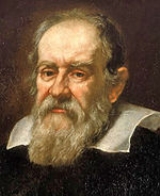
, mathematician
, astronomer
, and philosopher who played a major role in the Scientific Revolution
. His achievements include improvements to the telescope
and consequent astronomical observations and support for Copernicanism
. Galileo has been called the "father of modern observational astronomy
", the "father of modern physics
", the "father of science", and "the Father of Modern Science".
His contributions to observational astronomy include the telescopic confirmation of the phases of Venus
, the discovery of the four largest satellites of Jupiter
(named the Galilean moons
in his honour), and the observation and analysis of sunspots.
1609 Galileo Galilei demonstrates his first telescope to Venetian lawmakers.
1610 Galileo Galilei observes three of the four largest moons of Jupiter for the first time. He named them, and in turn the four are called the Galilean moons. Ganymede not discovered by him until January 13.
1610 Galileo Galilei discovers Ganymede, 4th moon of Jupiter.
1612 Galileo Galilei becomes the first astronomer to observe the planet Neptune, although he mistakenly catalogued it as a fixed star.
1632 Galileo's ''Dialogue Concerning the Two Chief World Systems'' is published.
1633 Galileo Galilei arrives in Rome for his trial before the Inquisition.
1633 The formal inquest of Galileo Galilei by the Inquisition begins.
1633 The Holy Office in Rome forces Galileo Galilei to recant his view that the Sun, not the Earth, is the center of the Universe.
1633 Galileo Galilei is tried before the Congregation for the Doctrine of the Faith for teaching that the Earth orbits the Sun.
What has philosophy got to do with measuring anything? It's the mathematicians you have to trust, and they measure the skies like we measure a field.![]()
My dear Kepler, what would you say of the learned here, who, replete with the pertinacity of the asp, have steadfastly refused to cast a glance through the telescope? What shall we make of this? Shall we laugh, or shall we cry?![]()
See now the power of truth; the same experiment which at first glance seemed to show one thing, when more carefully examined, assures us of the contrary.![]()
You cannot teach a man anything, you can only help him to find it within himself.![]()
I have never met a man so ignorant that I could not learn something from him.![]()

